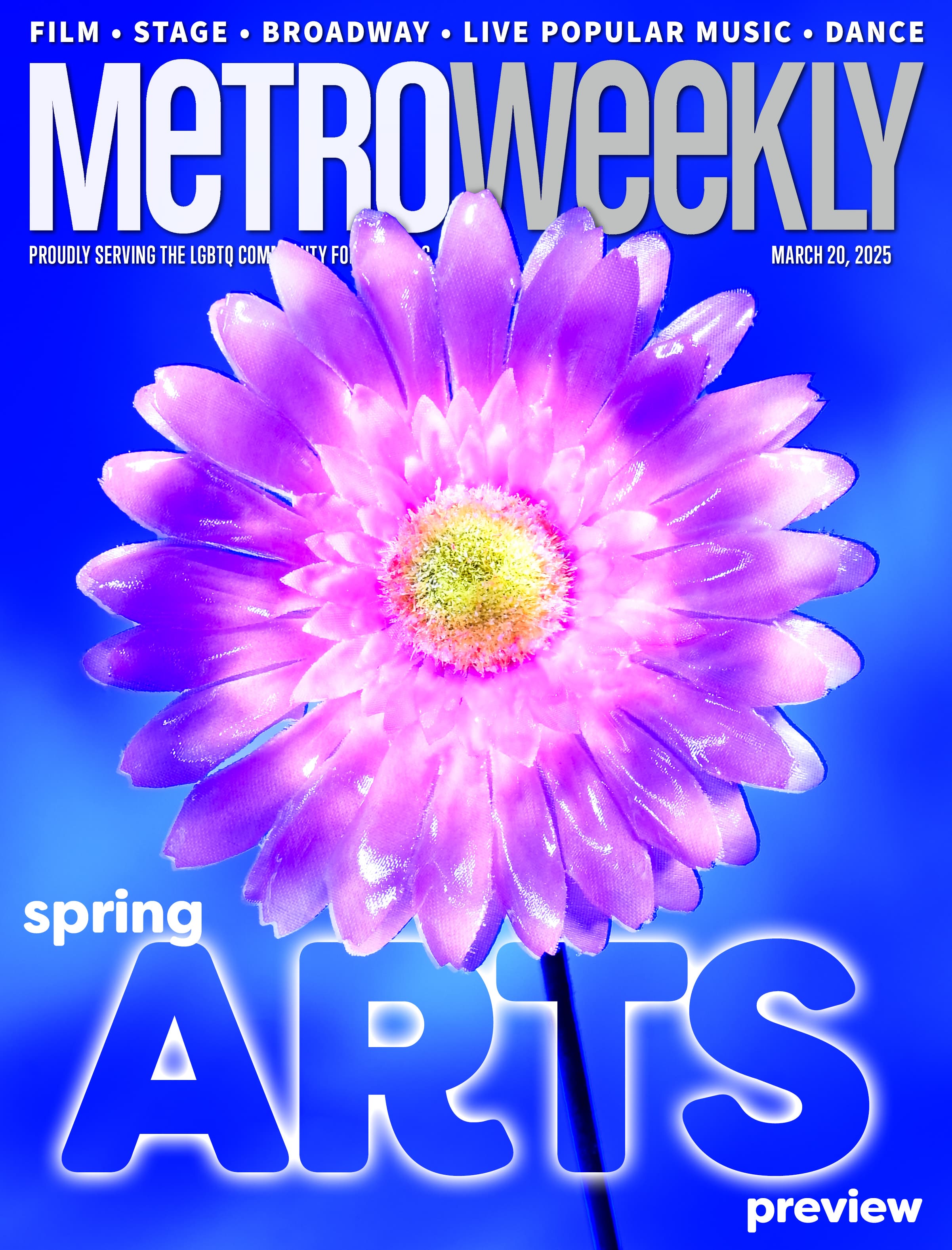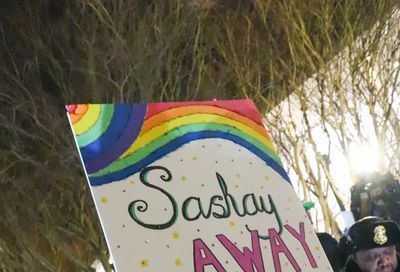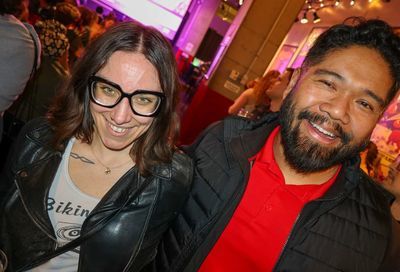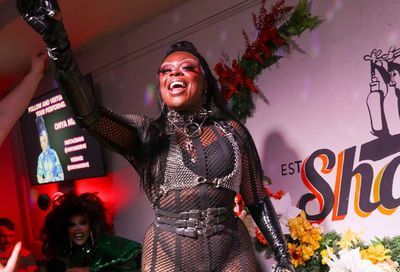Outrage over Urban Outfitters
LGBT and Jewish groups blast clothing store for selling tapestry bearing Holocaust symbol
 Urban Outfitters, Inc., a clothing and furnishing store whose primary audience is young consumers and hipster types, still hasn’t responded to calls from LGBT and Jewish groups outraged over the store’s latest decision to market a gray-and-white-striped tapestry bearing an upside-down pink triangle that some say is reminiscent of garb homosexual prisoners were forced to wear in concentration camps under the Nazi regime of the 1930s and 1940s. The Anti-Defamation League (ADL), the leading voice of opposition to hate groups, particularly those with anti-Jewish sentiments, issued a statement blasting the company for selling the controversial item.
Urban Outfitters, Inc., a clothing and furnishing store whose primary audience is young consumers and hipster types, still hasn’t responded to calls from LGBT and Jewish groups outraged over the store’s latest decision to market a gray-and-white-striped tapestry bearing an upside-down pink triangle that some say is reminiscent of garb homosexual prisoners were forced to wear in concentration camps under the Nazi regime of the 1930s and 1940s. The Anti-Defamation League (ADL), the leading voice of opposition to hate groups, particularly those with anti-Jewish sentiments, issued a statement blasting the company for selling the controversial item.
“Whether intentional or not, this gray and white striped pattern and pink triangle combination is deeply offensive and should not be mainstreamed into popular culture,” said ADL National Director Abraham Foxman, a Holocaust survivor. “We urge Urban Outfitters to immediately remove the product eerily reminiscent of clothing forced upon the victims of the Holocaust from their stores and online.”
“This is an affront to LGBT people, Holocaust survivors, their families, and anyone with an ounce of humanity.”
The Human Rights Campaign issued its own statement condemning Urban Outfitters’ actions, noting that this is not the first time that the chain has invoked controversial names, designs or symbols that have offended some people. In 2012, the company stirred the cauldrons of controversy offering a shirt with a yellow patch reminiscent of Star of David-shaped badges Jews were forced to wear under the Nazi regime.
“Urban Outfitters has seized yet again on imagery of the Holocaust, one of the most abhorrent chapters in world history, in an appalling effort to attract attention,” Fred Sainz, HRC’s vice president of communications, said in the statement. “This is an affront to LGBT people, Holocaust survivors, their families, and anyone with an ounce of humanity.”
Urban Outfitters did not return calls for comment.
According to a survey on the Metro Weekly website, 56.5 percent of readers feel the product is offensive and should be removed, 19.4 percent feel it’s a publicity move, 17.7 percent think the product is okay and would consider buying it, and 6.5 have no opinion on the matter. But while a majority of readers feel offended, others feel detractors are making too much of the incident.
Take our online survey: What do you think of Urban Outfitters’ Pink Triangle Tapestry?
“I don’t know why it’s a bad thing to have something remind us that a bad thing happened,” said Caleb Robinson, a gay D.C. resident who used to shop at Urban Outfitters when younger. “If the blanket conjures images of queer Holocaust victims, I’m okay with being reminded of those images. They’re a real thing that happened.”
Robinson doesn’t believe the company is savvy enough for this to have been a marketing ploy.
“I think most of the time Urban Outfitters thinks it’s edgy to decoupage antique flowers onto Taylor Swift vinyl. It’s pretty hard to think this was intentional,” he said. “And even if it was, if some designer somewhere felt inspired by an icon of Maximilian Kolbe or a trip to the Holocaust Museum, I’m not sure how that translates into hate speech worthy of firing up the outrage machine.
“I don’t think it will affect sales one way or another,” he added. “Their market is high schoolers visiting major cities on school trips and undergraduates who don’t care what they look like. These are hardly conscious consumers that sit and think before they purchase.”
But Gil Steinlauf, the out gay rabbi of conservative synagogue Adas Israel, said that people can not afford to be so cavalier about the controversy.
“This is potentially unhealthy, something really dangerous, used to be ‘shocking’ or make a ‘statement.’ One can never make light of the symbols and meanings of the Holocaust.”
“From a Jewish perspective, the resonance is obvious,” Steinlauf said. “This was a modern society — Germany in the 1930s — a Western society deciding that some people didn’t even deserve to exist. That it could happen there means it is important not to forget.”
Steinlauf is amazed so many in the LGBT community are not more vocal in their outrage over the use of the upside-down pink triangle. “[It’s a] horrific symbol we can’t take lightly.”
“For some gay people, even after the Holocaust, the persecution never stopped after the camps,” he said. “Many ended up being arrested or jailed by their own governments. To use that symbols as some sort of marketing scheme is really insensitive.”
Steinlauf added that there needs to be more awareness of history, and an effort to educate those who can’t grasp why some people are offended by the design.
“I think we need to use this as an educational moment, particularly in the gay community. We still live in a world that can, to make up a word, ‘otherfy’ us, make us an object of shame, fear and hatred in the world,” he said. “When it came to the yellow star shirts a few years ago, I was almost willing to stretch the belief that some people were just ignorant. But this is potentially unhealthy, something really dangerous, used to be ‘shocking’ or make a ‘statement.’ One can never make light of the symbols and meanings of the Holocaust.”
Support Metro Weekly’s Journalism
These are challenging times for news organizations. And yet it’s crucial we stay active and provide vital resources and information to both our local readers and the world. So won’t you please take a moment and consider supporting Metro Weekly with a membership? For as little as $5 a month, you can help ensure Metro Weekly magazine and MetroWeekly.com remain free, viable resources as we provide the best, most diverse, culturally-resonant LGBTQ coverage in both the D.C. region and around the world. Memberships come with exclusive perks and discounts, your own personal digital delivery of each week’s magazine (and an archive), access to our Member's Lounge when it launches this fall, and exclusive members-only items like Metro Weekly Membership Mugs and Tote Bags! Check out all our membership levels here and please join us today!

























You must be logged in to post a comment.